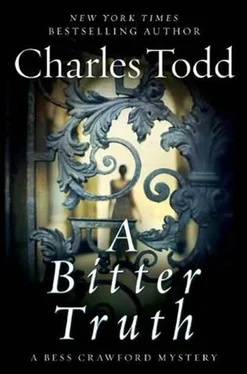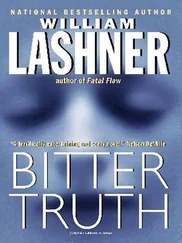“Then I’ll go the rest of the way alone, if you please.”
I stood there, telling myself not to think of what I’d seen as George Hughes. The first time, I’d been shocked, making an effort to think clearly and do what had to be done. Now, standing here, I remembered the man I’d talked to at two o’clock in the morning.
Constable Austin looked first at the body from just above it, and then squatted beside it. After a time, he scanned the bank of the stream, first this side and then the other. Getting to his feet, he scanned the scene once more, from the vantage point of height.
Finally, turning to me, he said, “Will you ask Dr. Tilton to come down, if you please, Miss?”
I went back up the path and passed Constable Austin’s message to Dr. Tilton.
He went down slowly, almost reluctantly, and I followed. Stopping a little way up the path he looked down at the body and then went forward to examine it. Stepping back, he pronounced George Hughes dead, and added that while the cold water made it more difficult to judge with any certainty just how long, he believed-as I’d thought earlier-that the deceased had been dead for some hours.
“At least since five or six this morning. No later than seven, I should think. I’ll know more when I’ve got him on the table.” He glanced back at me as he said the last words. “That’s to say, when I can examine him properly.”
At last Mr. Smyth was allowed to come and pray for the dead man. I shivered, thinking about that cold water, and the rector said solicitously, “Would you like my coat, my dear? This is no place for you. Perhaps you would prefer to wait in the motorcar? I’m sure Constable Austin would have no objection to that.”
But I shook my head, thanking him for his concern.
Finally, the constable stayed with the body while the four of us-Roger, the rector, Dr. Tilton, and I-drove back to Hartfield to arrange to have George Hughes brought up the path and into the town.
While this was being attended to, I took a moment to walk into The King’s Head, out of the cold, and once more ask for the use of their telephone.
I was glad when my father answered, rather than my mother. I said, keeping my voice low although there appeared to be no one around, “There’s been a death here in Ashdown Forest. One of the weekend guests. I shan’t be able to leave for a day or two. But I’m all right, there’s no problem.”
“What kind of death?” the Colonel Sahib wanted to know.
“A drowning. Or so it appears. I couldn’t tell. Suicide? He was despondent, I’m told. And he made rather a fool of himself last evening. That may have been the catalyst. On the other hand, he may have been too drunk when he fell to pull himself out of the water.”
I could hear someone coming. “I must go, this is a very public place.”
“Very well. Keep in touch, will you, Bess?”
“I’ll try. But it’s quite some distance to the telephone, and I have no means of traveling here on my own.”
He said something I couldn’t quite catch. And then Roger Ellis was coming through the hotel door, saying, “We’re ready to leave.”
I bade my father a hasty good-bye and put up the receiver, following the Captain out to the waiting motorcar.
Dr. Tilton had gone back to oversee the removal of the body, while the rector chose to accompany us to Vixen Hill. I was grateful for his presence. Otherwise I’d have been alone in the motorcar with Roger Ellis.
I needn’t have worried. He was taciturn, and after several efforts at conversation, the rector fell silent. In the rear of the motorcar, I had an opportunity to watch Captain Ellis as he drove, and he seemed to be distracted, his mind anywhere but on the twisting track. Once we almost ran into a flock of sheep moving across the road to newer pastures, and again we took a turn too fast and swayed dangerously near the ditch on the far side.
Mr. Smyth exclaimed, “Here, Ellis! Have a care.”
I was reminded that just about here, George Hughes had sworn he nearly struck a tree in his path. But I couldn’t see remnants that even resembled anything large enough to dent the wing of his motorcar and throw him face-first into the windscreen.
Somehow we managed to reach Vixen Hill unscathed, and everyone was waiting to hear what the police and the doctor had had to say.
But Roger Ellis shook his head. “I’ve not been told. I expect we won’t be for some time. Dr. Tilton will sort it out.” He paused, then, looking around at the circle of faces, he added, “Did anyone see George this morning? No? No idea when he might have gone for a walk? Well, the police will be here soon, asking questions. We can be sure of that. Meanwhile, we should try to go on as normally as possible. Hardly the time or place for entertainment, but we need to stay busy until the police have finished their work.”
Mrs. Ellis said, “I can’t quite understand why George had gone down to the stream. I’d expected to find him in the churchyard at the very least, or the church itself.”
“He may have felt the need to relieve himself,” Henry said. “It’s one explanation, at least. It would probably be best, Roger, if we went home,” he continued. “I don’t see that we can contribute very much to this business, and you’ll have your hands full. Meanwhile, what about George’s family? Is there anyone I should contact when I reach London? George’s brother is dead. Do you know who his solicitors are?”
“There’s a cousin, I think. I don’t know if George still dealt with Pritchett, Dailey, and Thurmond. You could ask, if you would. His things are here, and of course there’s the motorcar. And arrangements to be made.”
“Well, then, Margaret and I will see to our packing.”
I said, “The police won’t want anyone to leave until they’ve spoken to all of us.”
Everyone turned to stare at me as if I’d suddenly grown two heads.
Lydia said, “I don’t care what the police want. I’m leaving for London. If I must walk there. Margaret, if you could drive me as far as Rochester? I should be able to find a train there.”
Support came from an unexpected quarter. Mr. Smyth said, “Miss Crawford’s right, you know. Once the police are involved, they will wish to interview everyone who had contact with the-er-deceased. And of course we were all here last evening.”
Gran said, “No one I knew was ever involved with the police. It wasn’t done.”
Mrs. Ellis said, “I shouldn’t think it will take long. While I hate the thought of George drowning, it would be preferable to suicide. Did anyone think to see if he’d left a note in his room? It isn’t like him just to walk away.”
But I had already seen that room, and if there was a note-on the table by the bed or on the mantelpiece, the logical places-surely I’d have noticed it? Or Molly would have done?
“Again, that should be left for the police,” Mr. Smyth told her firmly. “I think, Ellis, you and I should see that Lieutenant Hughes’s room is locked until someone comes.”
“Is that really necessary?” Roger Ellis asked, and then answered his own question. “Yes, I expect it’s for the best. All right, come with me and we’ll see to it. Gran, I’ll need your keys, and yours, Mother. I’ll take Daisy’s as well. We’ll put them all in the bowl there on the table.”
Mrs. Ellis handed over her keys without comment, but Gran said, “I have held these keys since my mother-in-law died, and I am not giving them up now.”
Mr. Smyth crossed to where she was sitting. “Mrs. Ellis, I expected you to set an example for all of us.”
After a moment, she gave up her keys as well. The rector and Roger Ellis went out of the room and returned some ten minutes later to report that the door was properly locked and that Daisy had also surrendered her keys.
Читать дальше












